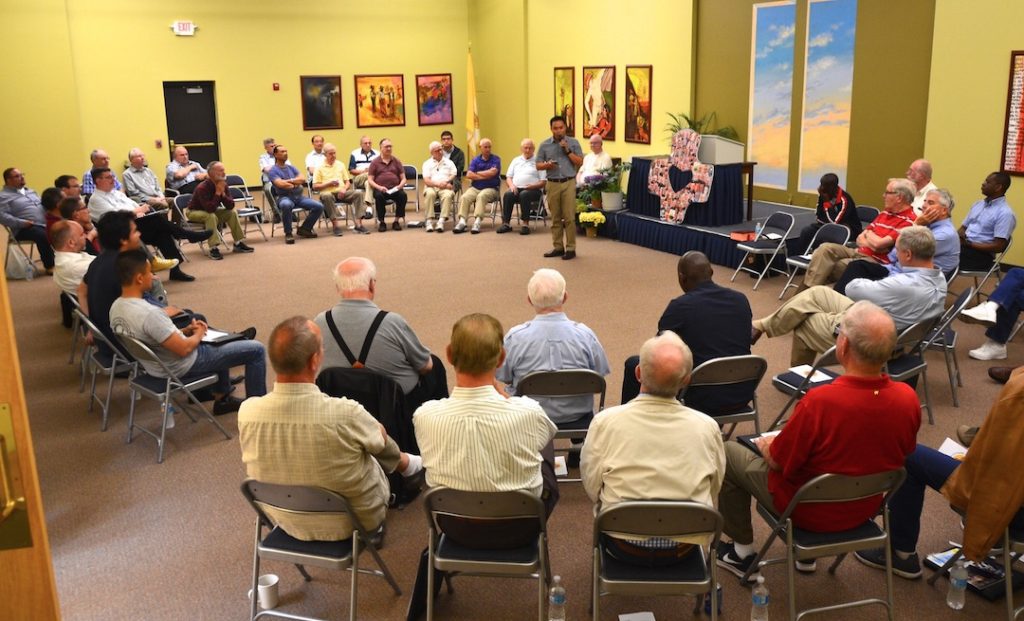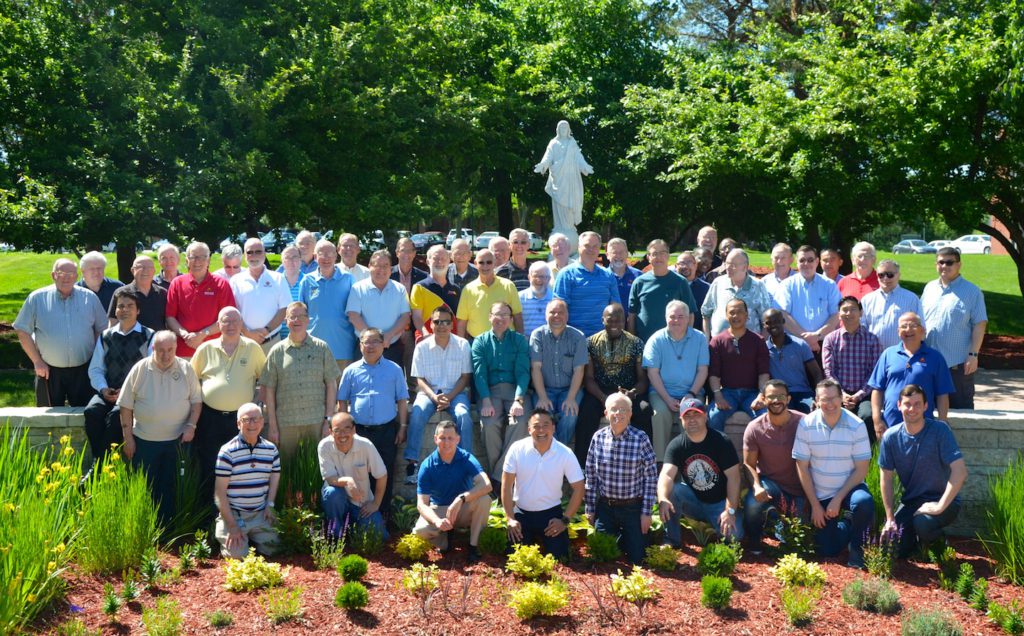
Click here to access the online photo albums from the assembly.
Assembly focuses on unity in diversity
“The Joy of Community Expressed in Our Mission” was the theme of the 2017 Province Assembly. It began with the Jubilee Celebration on June 5 and continued through the week with presentations on a wide variety of topics including personality exploration, multiculturalism, migration and community. It also included testimonies from the province’s students, reflecting on what they see in the Priests of the Sacred Heart and why they have chosen to follow their vocations with the community.
What color is your personality?
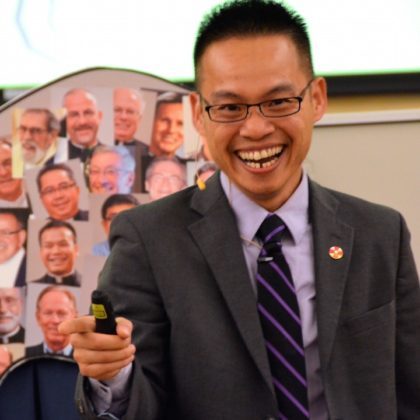
Dr. Young Hoang is a psychologist who works with local, state and federal agencies, as well as the Church. He has provided psychological testing to seminarians and workshops to faith communities on personality, boundary issues, conflict resolution, cultural diversity and leadership. Dr. Hoang led Tuesday’s assembly sessions, beginning with a presentation on personality exploration, helping people to understand their own personality traits and those others.
“We all have four temperaments, but generally one dominates,” said Dr. Hoang, who divided the traits into four colors: orange (risk takers, high energy, spontaneous, resourceful), green (analytical, process-oriented, research-based decisions), gold (serious, dependable, loyal, organized, appreciative), and blue (sympathetic, focus on serving others, seeks harmony in groups, creative, emotionally driven).
Assembly participants did an exercise to determine their dominant color, and then followed up with several activities to understand how people live and work together. In what situations do people of one personality color thrive, while another would be frustrated?
Dr. Hoang had several presentations broken up with lively songs –– complete with dance moves –– that got participants out of their chairs with arms in the air.
Why do I want to be an SCJ, a Dehonian?
Wednesday morning began with a video presentation that “celebrates our history and shows where we are now, what gives us as individuals and as a community joy,” said Frater Joseph Vu, SCJ, who put the presentation together. Following the video were testimonies from the candidates who spoke about what attracted them to the Priests of the Sacred Heart and why they decided to pursue their vocation with the community.
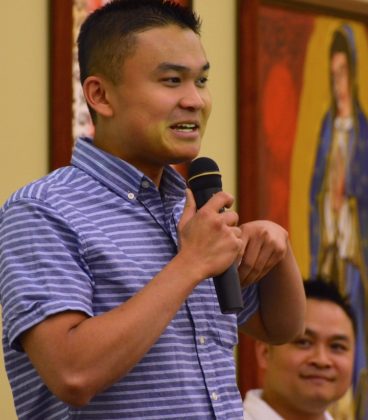
Phong (Paul) Hoang has been a candidate for three semesters; in August he will enter the novitiate. Paul began by reflecting on what is “home” for him now.
“When I first came to formation, I missed home, my family and friends in Houston,” he said. “Now, I am happy to go back to visit, but when I am in Houston, what I miss is Chicago [the formation community].”
Now “home” for Paul, is with his SCJ community.
“There is joy, spiritual joy, in our community,” he continued. “My favorite part of the day is Mass in the morning. We are there together in a sense of belonging, leaving each other with a sense of support for our day. We connect at meals; we connect in labor, doing dishes together.
“In the SCJ community I feel like myself and can actualize who I am; I feel at home, I feel that I belong,” he said.
For Henry Nguyen, who will be joining Paul at the novitiate, it was laughter that first attracted him to the community. A trainer for State Farm Insurance, he said that he wanted something else in life, he needed more to feel fulfilled; he wanted to serve others.
“In 2013 I came to the community and saw the joy and hospitality of the SCJs,” he said. I have visited communities in Houston and Mississippi and I have seen passion, love and joy… In Mississippi I saw a willingness to get out of the sacristy and serve, to be a prophet of love. What gives me hope for the future is the drive that we have as a community to continue to go to the people.”
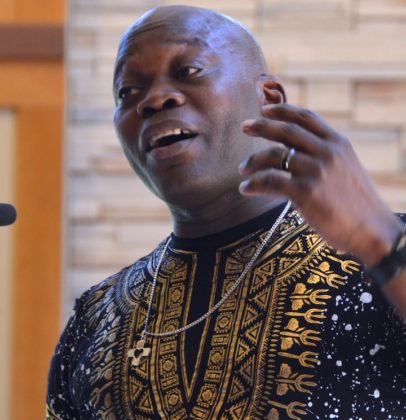
Celsus Roberts has an extensive background in social work and management (he earned degrees in both, including an MBA in heath care management) before pursuing his vocation.
“I am 44, and my whole life has been social justice, seeking ways to serve the poor,” he said. “I had great jobs and was already doing what Fr. Dehon calls us to do. But I wanted more and that is why I am here.”
That “more” included community life. “You find love in our house,” he said of the formation community. “We are challenged, but we care about each other.”
He continued, reflecting on the jubilee celebrations. “When I saw men who were celebrating 60 years of religious life I was inspired!” he said. “They give me hope, they challenge me. And with their help – and yours – I will celebrate many anniversaries of religious life.”
A new chapter at SHSST
Fr. Tom Knoebel, a familiar face to many from his years at Sacred Heart Seminary and School of Theology, briefly visited with the assembly. He will serve as SHSST president-rector for the next year, a role he has filled twice before.
“I can’t imagine a more fulfilling way to live out my priesthood,” said Fr. Tom, a priest of the Archdiocese of Milwaukee, about his 30+ years at Sacred Heart.
He continued, noting that the seminary is “at the edge of an exciting new chapter in its history. Major renovations are about to begin on the 50-year-old building. This summer we will see our largest summer ESL class ever. And our incredible ESL program continues as a resource for seminarians from around the country who come here for English and then continue to do their seminary studies with the assistance of our ESL faculty. Through our work we prepare men for effective ministry.”
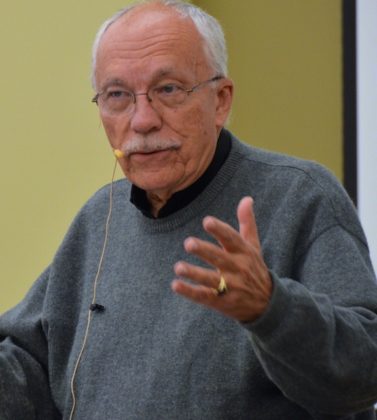
Fr. Tom said that he has been in dialogue with the Archdiocese of Milwaukee and noted its continued commitment to sending its seminarians to SHSST for their academic studies.
He also shared the news that the Apostolic Nuncio to the United States, Archbishop Christophe Pierre, will deliver the next Dehon Lecture.
“It is an honor and a privilege to work with and for you,” said Fr. Tom in is closing remarks. “Please remember the seminary in your prayers so that we may continue to fulfill the dreams of Fr. Dehon in new and exciting ways.”
The challenges of migration
“How marvelous God is! He will help you with what you need when you are doing the right thing, when you are doing good.”
The words were spoken by Sr. Norma Pimentel, MJ, during the first of several presentations about migration. Executive director of Catholic Charities in the Rio Grande Valley for over 12 years, Sr. Norma has first-hand experience with migrants at the southern border. Many, she said, are fleeing horrific situations in their home countries; she felt compelled to do something to help.
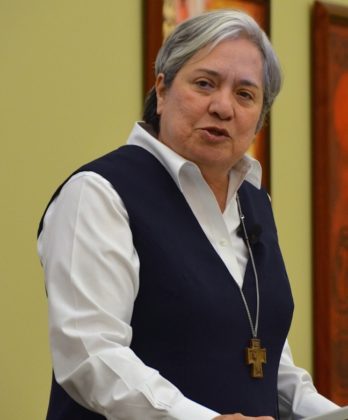
“I called Fr. Tom [the pastor at Sacred Heart Church in McAllen, Texas) and told him that I needed to borrow his parish hall for a few days,” she said.
That was three years ago. In that parish hall she created the Humanitarian Respite Center, a place for migrants to get food, a shower and other basic necessities before they are linked with family or sponsors in the United States.
Sr. Norma said that she had no plan when she asked to borrow the hall but knew that she had to do something.
“I called a woman from a prayer group and asked her to meet me at the parish hall. ‘What for Sister?’ she said. “We’ll figure it out when we get there! Call your friends, have them call their friends.”
That day Sr. Norma and her volunteers assisted 200 migrants. Three years later, that number grew to 73,000, all with donations. The Priests of the Sacred Heart are among those who continue to financially assist Sr. Norma with her efforts.
Many of the migrants who come to the center are children. “Families came to us destroyed in every way one could imagine.”
Sr. Norma talked about how the whole community –– people of other faiths, civic leaders –– have come together to help. “Sometimes we have had more volunteers than immigrants,” she said. “It can be chaos, but it is HOLY chaos.”
Officers at a border detention facility were brought to tears seeing her go in and pray with cells filled with terrified migrant children. “They thanked me for helping us to realize that they [the migrants] are human beings,” she said.
“We are the most powerful nation in the world,” said Sr. Norma. “We must do better.”
An impossible system
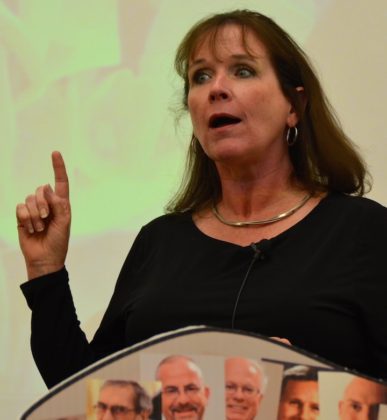
Sr. Norma spoke about the devastating situations that prompt people to flee their countries and come to the United States, as well as the pain and frustration that they continue to face once they cross the border.
Barbara Graham, director of Legal Services for Immigrants for Catholic Charities of the Archdiocese of Milwaukee, identified the many legal challenges migrants –– many of whom have valid reasons for seeking asylum –– face as they try to legally pursue residence in the United States.
“We are asking people with limited educations to go through an impossible system,” she said. Since they are not citizens of the United States, the migrants have no right to legal council. Generally, they have no money to hire representation. “Even children are expected to represent themselves,” said Ms. Graham.
“What can we do?” asked one of the SCJs.
“Get out and talk about Catholic social teaching,” she said. “Do bulletin inserts, talk about treating people with justice and mercy, that we must love our neighbor as ourselves. Educate the community but do it in a non-confrontational way so that you are heard. Most migrants are good people impacted by crazy laws. Catholic social teaching is so appropriate to this. ”
Community is organic
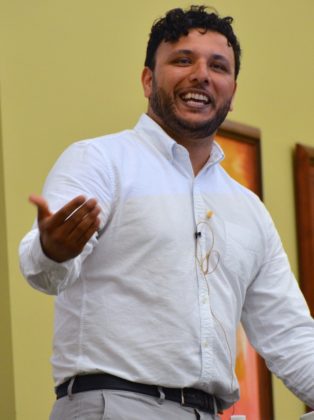
Returning from last year’s assembly to speak again this year was Grant Silva, PhD, an assistant professor of Philosophy at Marquette University. He talked about the role of community in the immigration debate.
“What are the factors that alienate us from community, stop us from making communal ties with each other?” said Dr. Silva. We need an understanding of community as a dynamic, ongoing, living thing.”
A community changes when the people in it change; the culture of the community changes. “Culture is an important thing, and there are elements of a culture that are substantive. But as we think of the material foundations of a culture we must to ask ourselves, ‘What unites people, what creates culture?’ Political membership is important [being a legal citizen] but something more important is the day-to-day lived experience…
“We have to learn to build ties that bring people together in the community.”
Conclusion
On Friday morning SCJs entered the assembly room and found the tables that they had been sitting around replaced with a circle of chairs. After morning prayer, Fr. Thi Pham, planning committee chairperson, thanked the SCJs for being a part of the week. “I am thankful for this SCJ family, especially the hospitality that I received from you. I am grateful to be an SCJ.”
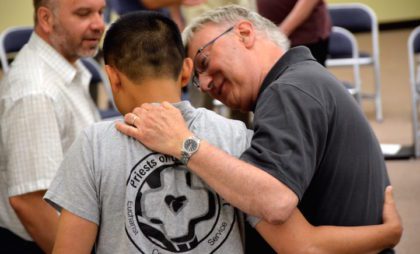
He joined SCJs in the circle and invited others to share their thoughts with the community.
“It is wonderful to see so many young people here, so many people from different countries,” said Fr. Johnny Klingler. “They give me hope for our province.”
“I was so powerfully touched by listening to our youngest members and candidates talk about their experience of us and their joy to be a part of us,” said Fr. John Czyzynski. “I am grateful to see that the SCJ message is alive in them.”
“Hope is alive,” said Fr. Zibigniew Morawiec. “There is energy here. I am grateful to the leadership of the province for making this possible, to help us see that our charism is alive.”
“All week I kept hearing and seeing how our province is much richer and stronger because of our growing multiculturism,” said Fr. Richard MacDonald. “I remember at previous assemblies talking about the challenge of cultural diversity. But now, we are speaking more about the joy of it. There are still challenges, but there are always challenges in living together. I am grateful for the people of many countries and cultures who are a part of us now.”
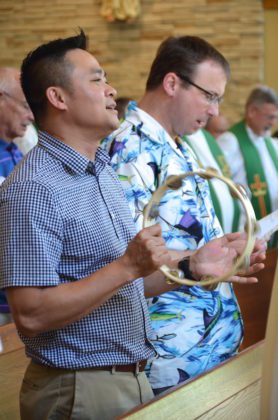
“When I am in South Dakota, I don’t always think about the rest of the province, I get busy with what is going on there,” said Fr. Vincent Suparman. “But here, I am filled with enthusiasm as I see the face of Jesus in others, knowing that we are a part of the same community.”
“I was moved and touched by the presentations this week,” said Fr. Richard Johnston. “What I noticed most was that I always heard people refer to ‘OUR’ province, not ‘MINE’ or ‘YOURS.’ This touched me, hearing even our youngest talk about ‘OUR’ province.”
“I looked at the logo a lot this week [a collage of the province’s membership within the SCJ heart and cross logo], said Fr. Bob Tucker. “I was awed as I looked at the faces, looked at all the people who are a part of the province, who are a part of me. Something pulled us together this week and the logo represented that.”
“We have become more diverse as a province and I am happy about that,” said Fr. Ed Kilianski in his closing homily. “We come from different backgrounds but God called us all to be sons of Fr. Dehon, to spread the love of Christ in souls and society wherever we can. It doesn’t matter what we call ourselves –– Dehonians, SCJs, Priests of the Sacred Heart –– what is important is what is in our hearts.
“Thank you for being my brothers.”
Click here to access the online photo albums from the assembly.
